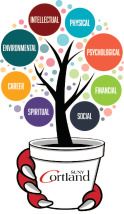
Red Dragon Wellness is a prominent piece of SUNY Cortland's 2024-2030 Strategic Plan: Focus for a Bright Future. Red Dragon Wellness encompasses the dimensions of personal and organization health. It is a commitment to a culture or care where our language, actions, policies, and decision are framed around concern and compassion for individuals. Wellness includes a sense of belonging where people feel seen, heard, and validated. This involves looking at aspects of wellness for our students and employees, committing to be an inclusive campus, and having an infrastructure that meets the needs of the people within the organization and responding to extern al factors affecting our community.
As part of the university's commitment to Red Dragon Wellness, the division of student affairs utilizes an integrated model of wellness that looks at students' holistically through their entire experience on our campus and in our community. This integrated model of wellness is designed to enhance students' understanding of the eight dimensions of wellness and help students to develop and strengthen skills and strategies for well-being.
Career
Career wellbeing is about finding meaning and fulfillment in what we do, and understanding what you want from your work as you design your life. What interests, goals and values do you hold? How do you define and pursue success? Career wellbeing is also about developing transferable skills and competencies for current or future careers, including internships and student employment opportunities.
Environmental
Environmental wellbeing is based on the idea that our surroundings facilitate our personal development. Environmental wellbeing flows from a physical environment that is holistically well: one with healthy lands, waterways, and built spaces; one that provides us with opportunities to relax, reflect, and restore all our senses. It includes how we contribute to, and engage with, spaces that are safe, accessible, and sustainable.
Financial
Financial Wellbeing is essentially our ability to manage what we have in a responsible manner. It includes our ability to meet basic needs and manage money and related resources to meet both short- and long-term goals. Having financial wellbeing impacts many other areas of your personal well-being. When you’re able to balance managing your money, spending responsibly and saving for the future, you can achieve financial well-being. Those skills last a lifetime.
Intellectual
We attain intellectual wellbeing when we view learning as an end unto itself rather than simply a means to a specific personal or professional outcome. We move beyond making observations and start developing ideas. Intellectual wellbeing is characterized by curiosity and a perpetual quest for new ways to help ourselves and those around us. It is dedicated to the notion that the greatest minds go beyond observations and inspire others by cultivating ideas. Intellectual wellbeing is directly connected to personal growth through academics, lifelong learning, and engaging in new ideas. It includes allowing your brain both stimulation and rest for critical thinking, curiosity, and creativity.
Physical
Knowing (and listening to) your body and giving it what it needs for health, healing, and energy. Identifying and caring for your physical needs, and the awareness of influences that impact overall health. Physical wellbeing melds our needs for responsible consumption, activity, and rest-driven renewal.
Being well physically means more than eating more fruits and vegetables. It means getting moving in ways that you find fun. It also means getting consistent sleep, keeping appointments with health-care providers and making conscious decisions every day to take care of your body.
Psychological
Your emotional wellness. Your ability to cope with and learn from life’s ups and downs is just as important as your physical well-being. It can include recognizing your emotions and reactions, learning how to respond to them, and realizing that the struggles we face can also help us grow. Be kind to yourself as you recognize and experience a wide range of emotions.
We improve our psychological and emotional wellbeing when we come to know our pressure points and learn how to adapt to them. Handling life’s ups and downs is more manageable when we’ve learned to accept that they happen. Oftentimes, we can make preemptive strikes against them by knowing whom and when to ask for help. Left alone, issues negatively affecting your psychological wellbeing won’t just go away. Other signs you may be struggling with psychological wellbeing are poor sleep, not being able to pinpoint your stressors, or not being able to identify healthy ways to cope.
Social
Building and engaging in trusting, respectful, and authentic relationships. Social wellbeing includes the ability to create harmony in one’s relationships with others, demonstrate effective communication skills, develop the capacity for healthy intimacy and cultivate a support network of caring friends and/or family members. An important aspect of social wellbeing is the cultivation of an inclusive community that promotes an environment of empathy, civility, respect, and empowers others and contribute to the common good.
Spiritual
Spiritual wellbeing is about finding meaning and purpose in your life. The concept of spirituality has as many interpretations, but generally speaking, it can be achieved when our core values and beliefs tie us to a sense of something larger than ourselves and empower us to act according to those beliefs. It includes self-reflection about one’s values and beliefs to intentionally discern goals and contributions, and explore meaningful steps toward actualizing one’s future.